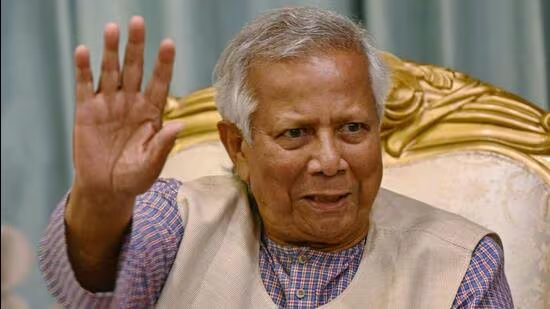Bangladesh signs treaty to combat enforced disappearances
Dhaka: Bangladesh on Thursday signed the Instrument of Accession to the International Convention for the Protection of All Persons from Enforced Disappearances, paving the way to make the previous regime more accountable for such incidents.

Interim government chief Muhammad Yunus signed the instrument at the weekly meeting of the Council of Advisers, amid loud clapping by those present. “It is a historic occasion,” Yunus said.
The instrument was signed a day before the international day for the victims of enforced disappearances. Earlier this week, the interim government formed a commission to investigate every case of enforced disappearance involving the security forces during former premier Sheikh Hasina’s 15-year authoritarian rule.
On 14 August, Mayer Dak, a platform of relatives of victims of enforced disappearances and civil society, issued a 24-hour ultimatum to arrest the perpetrators of such acts during the tenure of Hasina, including Ziaul Ahsan, a former major general in the army.
Law enforcement personnel arrested Ahsan, who is commonly accused of involvement in enforced disappearances, after he was sacked from the army.
Noor Khan, a human rights activist, said the signing of the instrument is a good move as Bangladesh will have to report to the United Nations about enforced disappearances.
“Now, Bangladesh will have to make laws to implement it,” said Khan.
Last August, Human Rights Watch said that, according to Bangladeshi human rights monitors, security forces had committed over 600 enforced disappearances since 2009. While some people were later released, produced in court, or said to have died during an armed exchange with security forces, nearly 100 people remain missing.
The previous government had refused to take up an offer from the UN to help establish a specialised mechanism to investigate allegations of enforced disappearances in line with international standards.
“Bangladesh authorities are fooling nobody by continuing to deny the reality of enforced disappearances, and instead are prolonging the suffering of families who are desperate to know the whereabouts of their loved ones,” said Julia Bleckner, senior Asia researcher at Human Rights Watch.
“The government should show genuine commitment to addressing abuses by cooperating with the UN to open an independent commission of inquiry into enforced disappearances.”
In December 2021, the US government designated Global Magnitsky human rights sanctions against Bangladesh’s Rapid Action Battalion (RAB) and top commanders implicated in abuses, particularly enforced disappearances and extrajudicial killings.
Saad Hammadi, fellow at the Balsillie School of International Affairs in Canada, who has advocated for human rights protection in Bangladesh for many years, said:
“For the longest time, Bangladeshi ministers have denied the crime of enforced disappearance. The accession to the international convention gives Bangladesh’s government the premise to acknowledge this crime, investigate and be accountable for the allegations.”
He said this development will define the scope of the newly formed inquiry commission to investigate allegations of enforced disappearances.
“The government and the domestic inquiry commission should support an international investigative mechanism under the UN to bring the perpetrators, some of who might have fled the country, to justice through international accountability mechanisms,” he added.
Disclaimer: The copyright of this article belongs to the original author. Reposting this article is solely for the purpose of information dissemination and does not constitute any investment advice. If there is any infringement, please contact us immediately. We will make corrections or deletions as necessary. Thank you.
Title:Bangladesh signs treaty to combat enforced disappearances
Url:https://www.investsfocus.com







